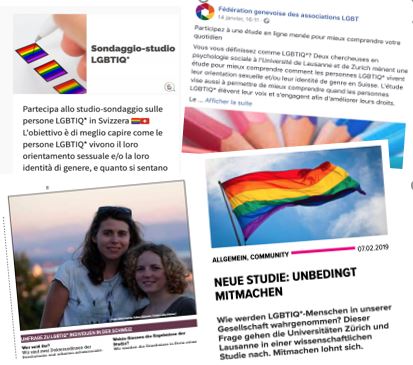|
The grass is not always greener in my neighbor’s garden… At least, that’s what people seem to think. In fact, when asked about others’ opinions toward sexual minorities’ issues, people tend to overestimate the level of intolerance in their society regardless of their personal views. In Switzerland, for example, residents thought that most other residents, including their neighbors, were intolerant toward same-sex marriage and same-sex parenting. Yet, this was not the case; Swiss residents were actually much more tolerant than what people thought (Eisner, Spini, & Sommet, 2019; Eisner, Turner-Zwinkels, Hässler, & Spini, 2019). You wouldn’t be surprised to hear that this perception of intolerance might impact on sexual and gender minorities’ well-being. To illustrate, perceptions of an intolerant climate toward sexual and gender minorities might raise expectations of rejection and, therefore, lead to concealment of one’s sexual orientation/gender identity and internalization of stigma. Moreover, perceptions of an intolerant climate might also affect social change processes themselves. Indeed, if you perceive that others in your society are intolerant of sexual and gender minorities, you might be discouraged from engaging in support for social change: “People aren’t ready for social change, thus, a social movement won’t be successful. So, let’s wait a little bit longer before pushing toward greater equality for sexual and gender minorities”. On the other hand, the intolerance you perceive might make you angry. This may lead you to believe that social change cannot be achieved without action: “This situation makes me so angry, we need to engage now because the situation is not getting better”. Hence, perceptions of intolerance could discourage or encourage support for social change. What did we do? While perceived climate might be relevant in all social movements, perception of others’ intolerance might particularly impact countries in which there are striking legal disparities. In Switzerland (and this might surprise you) sexual and gender minorities still suffer from many legal discriminations, such as being denied the right to marry and adopt. The legal discrimination goes so far that a single person can adopt a child, but as soon as you are in a registered same-sex partnership, you are not allowed to adopt children anymore. Importantly, while both sexual and gender minorities face many legal inequalities, the legal challenges of both groups are different. The present research was tailored to sexual minorities (e.g. homo-, bi-, pansexual people) since up-coming public voting regarding same-sex marriage affects sexual minorities. We tested the basic question of whether perceiving intolerant others discourages and/or encourages support for social change toward greater equality for sexual minorities in Switzerland. We gathered answers in our online questionnaire from sexual minorities (1220 participants) and cis-heterosexuals [1] (239 participants). What did we find? Perceiving others to be intolerant actually has a paradoxical impact on one’s support for social change:
What does this mean? Our research shows that the following detrimental effects of perception of an intolerant climate on support for social change must be key considerations when mobilizing for social change:
- Léïla Eisner & Tabea Hässler
This blog post is based on: Eisner, L., Spini, D., & Sommet, N., (2019). A Contingent Perspective on Pluralistic Ignorance: When the Attitude Object Matters. International Journal of Public Opinion Research. https://doi.org/10.1093/ijpor/edz004 Eisner, L., Turner-Zwinkels, F., Hässler, T., & Spini, D., (2019). Pluralistic Ignorance of Societal Norms about Sexual Minorities. Manuscript under review; Eisner, L., Hässler, T., & Settersten, R. (2019). It’s time, act up for equality: Perceived societal norms and support for social change in the sexual minority context. Manuscript in preparation. [1] The term cis-heterosexuals denotes heterosexual individuals whose gender identity corresponds to their assigned sex.
0 Comments
Your comment will be posted after it is approved.
Leave a Reply. |
AuthorsAll researchers in the Social Change Lab contribute to the "Do Good" blog. Click the author's name at the bottom of any post to learn more about their research or get in touch. Categories
All
Archive
July 2024
|
Social Change Lab
Join our mailing list!Click the button below to join our mailing list:
Social Change Lab supports crowdfunding of the research and support for the team! To donate to the lab, please click the button below! (Tax deductible receipts are provided via UQ’s secure donation website.) If you’d like to fund a specific project or student internship, you can also reach out directly!
|
LocationSocial Change Lab
School of Psychology McElwain Building The University of Queensland St Lucia, QLD 4072 Australia |
Check out our Privacy Policy
Copyright © 2017

 RSS Feed
RSS Feed
